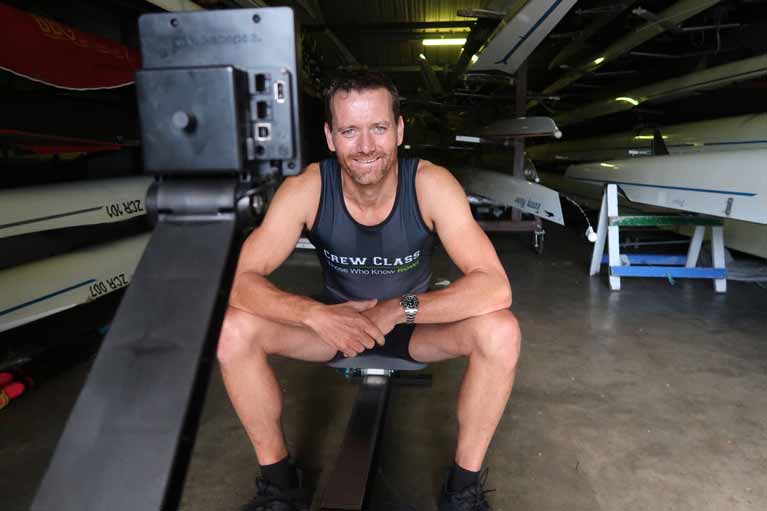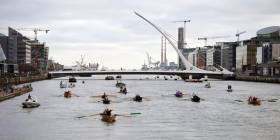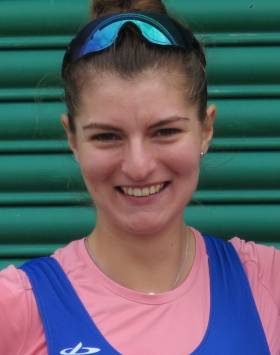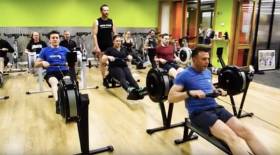Displaying items by tag: Niall O'Toole
Skiff Racing a Knockout for Former World Champion
Niall O’Toole, the first Ireland world champion in Olympic-class rowing who now runs indoor rowing courses, remembers fondly how he was invited to race in a boat class that goes back over a century.
Cracking the Code of East Coast Skiff Racing
By Niall O’Toole
It was a dreary November night. A green army of St. Patrick’s singlets filed into the room. I wanted to make a good first impression before our first indoor rowing session began. I proceeded to introduce myself. “Hi Guys, I’m Niall O’Toole, three-time Olympian, world champion, former world record holder and multi world medallist”. A deadly silence swept through the room. I didn’t hear any expletives, but their faces said it all.
Three months passed before there was any glimmer of recovery. Then, came the request: “Would you like to race skiffs, Niallo?”. I expected to go through a data-driven, seat-racing selection process, but discovered that crew selection was considered more an art form than a science. In quiet corners, canny, skiff insiders decide the fates of crews, as they have done since the late 19th Century, where the tradition of ‘Hobbling’ first began. Back then skiffs raced for piloting rights to cargo ships. Now the tradition of racing skiffs continues. So it was that I joined my first skiff crew and started training.
 Niall O’Toole
Niall O’Toole
The first thing I noticed was the beauty of the boats. I was used to brittle carbon fibre Olympic missiles, built to specific weights and criteria, which seem dull and lifeless by comparison. Skiffs are living, breathing works of craft, ever-changing over time and lovingly maintained by obsessive boatmen; men like my late father Jimmy O’Toole. He was a shipwright for Guinness on the Lady Patricia, which brought crates of the black stuff to Liverpool. He built and repaired many wooden boats in his time, including one in the back garden of our terraced house, which turned out to be too big to get out. Fifteen hedges, fences and brick walls later, he slotted it out through a break between two houses.
Being surrounded by wooden boats again brought back fond memories of my Dad. I’m still none the wiser about what clubs deem a ‘fast’ or ‘slow’ boat’, though.
Crews grow comfortably accustomed to their skiff’s quirks, and are suspicious of change. A new boat into the club can find itself labelled ‘slow’ and relegated to life on a rack. The mythology around oars is unique too – no two wooden oars are exactly the same. Weight, stiffness, size of blade, handle-width and grip all play into making the perfect oar for any one individual’s taste. It took me weeks to find an oar that gripped the water the way I liked. I marked it with tape to make it easy to find again, but found that tape is easily removed and an oar easily hidden. I’ve seen many a ruckus on the dock over an oar that found itself favoured by two crews.
My first race for St Pat’s was in Dun Laoghaire. A stalwart of the club, Philip Murphy, whispered in my ear: “It’s rough out there Tooler! Make sure you get water.” I wasn’t sure what he meant. Due to the rise and fall of the boat, it was impossible to adjust your hand position enough to stay in contact with the water. Pulling air doesn’t give you boat speed, but we managed to lead the race into the first turn.
Prematurely, I saw myself adding another notch to my glittering rowing career, when amidst the whirlwind of cox’s screams, burning lungs, and the strength-sapping manoeuver of trying to use my oar as a handbrake to swing the boat around, we exited the turn in second-last place. We tried to pick up the pace, but the water was just too big to make up any of the ground we’d lost. Then we rounded the second buoy to find a rogue skiff on a bad line coming straight for us. I ducked and heard an almighty crack. ‘Skipper’, my crewmate, was clocked with an oar to the head and knocked clean out, hitting the bottom of the boat with a thud. Stuff like that just never happens at the Olympics!
I spent the next couple of months learning the subtleties of the sport; learning the craft, culture and code. It’s not all about straight-line speed - you do need to be fit and fast, but it’s also about currents, streams, winds, waves, tides and a little help from lady luck. It’s about your cox finding the fastest racing line and your crew communicating around the turn with their lungs on fire. I came to realise that the physical exertion and pain you feel in skiff racing is every bit as tough as the Olympic sport I know. Most importantly, I learnt that St. Pat’s is truly a community based club; in that humble old Dublin, no-nonsense kind of way. In a club where people truly look out for each another, I found a warm welcome, a sense of place and lifelong friends. In the twilight of my rowing career, I had no idea that was possible.
The All In A Row charity event will be held on the Liffey on Saturday, November 30th. Rowing, kayak and canoe clubs along with private rowing boat owners can be part of a 10-hour row/paddle to raise money for both the RNLI and The Irish Underwater Search and Recovery Unit. The boats will travel from St Patrick’s Rowing Club at Tom Clarke Bridge (formerly East Link Bridge) to Heuston Station Bridge and to the Grattan Bridge during high tide. During low tide it can be viewed along the banks of the Liffey.
#Rowing: Ireland will send a big team to the World Coastal Rowing Championships in Hong Kong early next month (November 1st to 3rd). Coastal Rowing is growing and may become part of the Olympic programme.
Niall O’Toole (49) was Ireland’s first world rowing champion. The three-time Olympian now runs Crew Class for indoor rowers. He tried his luck at the Irish Offshore Rowing Championships in September in Co Antrim. Here are his impressions.
The Rock’n Roll of Offshore Rowing
By Niall O’Toole
I was excited for my first offshore race. Rounding the corner, I arrived at the location to big breaking waves crashing onto the shoreline. I immediately knew this was something different: it was going to be ugly and unpredictable.
I fully hoped that the regatta would be called off, due to the extreme weather conditions. I looked to other competitors for solace. Instead of being able to gauge their fear, I was met with wide grins and a crazy glint in their eyes: they were unfazed. This was their normal. They were just looking forward to getting amongst it.
I’m used to something different. A sterile environment in your own lane, as fast as you can row from A to B over 2km. You train for your own race, your pace and pushes planned down to a T. You have very little to think about on the day, other than executing that race plan. A starter holds your stern, everyone in line, traffic lights signal the off. It’s all inch-perfect and highly controlled. You may have one or two glances out of the boat, but essentially you row without interference from others.
In Olympic-style rowing, we are guarded from the elements. Most international courses are strategically located to have a prevailing wind in one direction to avoid rough water. If there is wind, the water tends not to be affected. I wasn’t used to nature writing the rules.
There was a delay to racing due to a late change of course. We were told that it was no longer safe for the safety boats, and that rowers were likely to be pushed onto the rocks. When the officials said, “You need to ask yourself, is it safe for you to row today?” the answer was screaming in my head. The organisers said they’d run the first race and would review whether they would continue the regatta after that. I took this to mean that the first race competitors were now officially the canaries down the mine. They got around, despite buoys moving during the race, and the regatta continued, to my growing fear and dismay.
Shouldered with the weight of some rowing heritage behind me, I had to harness my dwindling toughness and get out onto the water, launching amidst breaking waves on the beach. Within 30 seconds I was completely soaked and instantly thought we needed a bigger boat.
The race starts with a floating start and is the only real part that you can plan. There are no individual lanes, just a fight for the best line around a 4km course of buoys. Your only real hope is to fly out the start and get clear of the field down to that all important first buoy, before traffic starts hitting you and rowing becomes a contact sport.
Battling the elements, and trying to keep the boat straight without a tiller was absolutely exhausting. Given my experience, I went out high and hard, but found it difficult to factor in the added dimensions of staying away from other boats and staying on the right lines to hit the markers. Trying to keep the boat straight against a crushing side-wind completely seized up my forearm within minutes of the start. Within the washing machine of the wind and waves, and the physical exertion of breathing through your ears, you are punished for small navigational mistakes which are big errors, handing away hard-fought lengths to more savvy and seasoned competitors.
I did enjoy it though, despite myself. The rush of adrenaline you get flying around buoys, fighting for your line, with other boats breathing down your neck. You are completely focused on getting in and out of the turn as quickly as possible, whilst also paranoid that your competitor is taking a better line, for reasons as yet unknown to you. The sheer volume of data you have to integrate along with the physical exertion maxed me out in a way I couldn’t have imagined.
This is one hell of a sport. Chaotic, unpredictable and exhilarating. It really is the rock’n roll of rowing. I’m completely hooked.
Niall O’Toole was part of the winning men’s quadruple, a composite crew of Wicklow, Kilurin and Ring, at the Irish Offshore Championships.
Monika Dukarska Shines at Irish Offshore Championships
#Rowing: Ireland international Monika Dukarska won in the women’s single, double and coxed quadruple for Killorglin at the Irish Offshore Rowing Championships in Ballygally, Larne, on Saturday. Rough weather in the morning forced the organisers to alter the course. The men’s coxed quad was won by a composite crew which featured Niall O’Toole. Patrick Boomer of Loughros Point won the men’s single.
Irish Offshore Championships, Saturday, Ballygally, Larne (Selected Results; winners)
Men
Quadruple, coxed: Wicklow, Killurin, Ring 16 min 54 sec.
Double: UL Tyrian 19:41.
Single: Loughros Point (P Boomer) 20:27.
Women
Quadruple, coxed: Killorglin 19:05.
Double: Killorglin A (M Dukarska, R O’Donoghue) 19:50.
Single: Killorglin (M Dukarska) 20:39.
Mixed
Double: Arklow A 20:17.
Get In New Year Shape With ‘RowFit’ Classes At The Royal St George
#RowFit - The Royal St George Yacht Club has teamed up with former Olympic rower and world record holder Niall O’Toole to offer members and friends a unique fitness experience for the New Year.
Participants in the Crew Class Indoors programme will get ‘RowFit’ as they work 85% of their muscles with every stroke of the rowing machine.
The programme is described as “a fantastic unparalleled exercise to get stronger, leaner, and work your core and learn to row in a fun team environment.”
Classes began this week, with two sessions on Tuesday and Thursday evenings. For more details and how to book a session see the RStGYC website HERE.
Irish Rowing News. Rowing Clubs, Regattas, Sculling & Coastal Rowing
Afloat's rowing coverage encompasses the widest range of activities undertaken on Irish lakes, rivers and coastal waters. We aim to bring jargon free reports separated in to popular categories to promote the sport in Ireland.
Click this link for the latest Irish Rowing News and Results.
Rowing is one of the oldest of all sports, and FISA (Federation des Societes d'Aviron) the governing body of the sport, which was founded in 1892, is the oldest international sports federation in the Olympic movement. FISA has 128 member federations worldwide, organises World and Olympic Championships and World Cups and promotes all forms of rowing – including the non-Olympic event of Coastal Rowing.
The Irish Amateur Rowing Union, a federation of rowing clubs, has a history almost as long as the international body: it was founded in Dublin in 1899. Now reconstituted as Rowing Ireland, in 2010 the union had 69 affiliated clubs spread throughout the island of Ireland and 2,500 registered athletes. The National Rowing Centre is based at Farran Wood on Inniscarra Lake in County Cork. The domestic season traditionally culminates in the National Championships in mid-July.
Rowing is divided into sweep rowing and sculling. Sweep rowing involves the participant using both hands on one oar; in sculling the participant holds one oar in each hand. Boats may include a cox (coxwain), who generally steers the boat by means of wires, and guides and rallies the crew. In the shorthand of the sport, coxless crews are denominated by a minus (e.g. a men's coxless four is M4-). Senior sculling crews generally do not include a cox. The set distance for competition in regattas is 2,000 metres. Six-lane racing is standard.
The Olympic Games are the highest level at which rowers compete: there are 14 Olympic rowing classes, eight for men and six for women. Only three of these are in the lightweight classification, the most successful one for Irish rowers: men's fours (LM4-) and double sculls (LM2x) and women's double sculls (LW2x).
Individual oarsmen in lightweight crews cannot exceed 72.5 kilograms, and the average weight of a lightweight crew, excluding the cox, cannot be over 70 kgs. A single sculler cannot be above 72.5 kgs. The equivalent for women are 59 kgs (highest weight) and 57 kgs (average for oarswomen in a crew).
Ireland's best results at the Olympic Games came in 1996 and 1976. At Lake Lanier in the 1996 Games the men's lightweight coxless four crew of Tony O'Connor, Neville Maxwell, Sam Lynch and Derek Holland were beaten by less than a second for the bronze medal. In 1976 in Montreal Sean Drea finished fourth in the men's single sculls. In 2004 the Ireland lightweight four finished sixth in Athens.
The annual World Rowing Championships feature the 14 Olympic events and eight others for able-bodied athletes along with four adaptive events. The Championships have been a much happier hunting ground for the Irish, especially in the non-Olympic events. Niall O'Toole won gold in the lightweight single scull in 1991 and in 2001 Ireland won three World Championship golds: Sam Lynch (lightweight single scull); Sinead Jennings (women's lightweight single) and Tony O'Connor and Gearoid Towey (lightweight pair). Lynch sucessfully defended his title in 2002.
After the Olympics and the World Championships, the third big rowing competition is the World Cup series, usually three regattas in Europe. The World Under-23 Championships, the World Junior Championships, and, for countries in these islands, the Home Internationals, are also big international events. The European Championships were revived in 2006 after a three-decade break and Ireland took part in 2010.
Henley Royal Regatta, with the finals in July each year in the English town, has a special place in the calendar due to its history and its social aspect.
Our coverage though is not restricted to the Republic of Ireland but encompass Northern Ireland Scotland, Wales and the Irish Sea area too.
We're always aiming to build on our rowing content. We're keen to build on areas such as online guides on rowing. If you have ideas for our pages we'd love to hear from you. Please email us at [email protected]































































